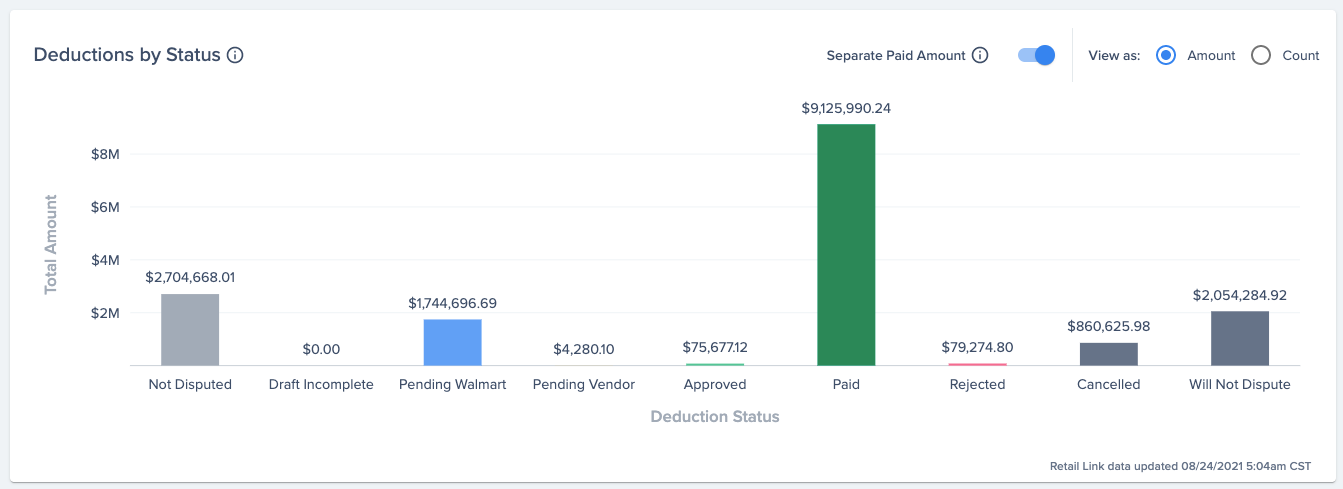What Is a Post Audit Claim?
Learn about:
- The types of post audit claims
- How to prevent post audits
- Disputing post audit claims
There is a variety of deductions that Walmart suppliers must face while doing business with the retailer. These range from accounts payable deductions, which come off invoices, to accounts receivable deductions, which come in the form of fines to the supplier. There are also post audits.
Walmart creates post audit claims, and the claim numbers usually are nine digits long. Walmart Post Audit conducts reviews of transactions, email correspondence, and supplier agreements between Walmart and suppliers to identify and recover funds lost while doing business.
Walmart conducts post audit reviews after Accounts Payable and Accounts Receivable have finalized their payments and deductions processes. This means that the post audit timeline runs up to two calendar years after the initial transaction.
Depending on what claims Walmart’s accounting team generates for a supplier, they could receive multiple claims within that two-year time frame because Walmart has two additional auditing firms following up their research to ensure that they get all funds due to them.
Upon creating claims, the auditor will send the supplier contact a copy of the entire claim package. Walmart recommends that suppliers create a generic post audit distribution address, provide that to Walmart, then manage who receives those emails internally within their organization.
Types of Post Audit claims
There are many types of post audit deductions. Some of the most common are for:
- Pricing
- Allowances
- Freight & Handling Charges on Returns
- Trucks Ordered Not Used
- Failure to Combined Loads
Pricing
Pricing post audit claims can occur when an item is price-protected, and all the units were not captured in the coop when it was calculated. Other pricing scenarios may occur as well.
Allowances
Example allowances include cash discounts, defective allowances, and quantity allowances. These allowances are typically off-invoice, not given at the time of invoicing, and come in the form of fines.
Freight & Handling Charges on Returns
If you are a collect supplier, you could see charges for freight and handling on returns. The auditors will calculate the cost of delivering the cargo on the damaged product and create an audit to recover the freight charges for the item.
Walmart accounting calculates a 10% handling charge on all damaged products. This charge occurs to recover the cost of handling the product that Walmart could not sell.
Trucks Ordered Not Used
Trucks Ordered Not Used (TONU) is a charge that occurs anytime the supplier doesn’t use a truck, and Walmart or the supplier must reroute the driver. Suppliers may see this claim when they cancel a collect order.
Failure to Combined Loads
Audits for Failure to Combined Loads are typically for a collect supplier that does not utilize the loads properly.
Anytime a purchase order is removed from a truck, the logistics company dispatches a new truck to cover the load.
These are just a few examples of post audit claims.
How to prevent post audits
Preventing post audits depends on the type of deduction. Here are some examples.
Pricing
Suppliers wanting to prevent pricing post audits should email verbiage when negotiating pricing claims with your buyer. Suppliers must note in the email body that this is just an offer until an email between the supplier and the buyer confirms any updated pricing offers.
Allowances
The most common error in allowances is not giving the allowances as the vendor agreement notes. These claims also occur when the allowance is not in the proper segment in the EDI raw data where Walmart or Sam’s state that it should be.
It is common among suppliers to not pull all the data that is on the EDI raw data, therefore causing them to miss where the allowances should be. To prevent this, suppliers will need to ensure that they pull all segments of the order’s raw data before invoicing.
Freight & Handling Charges on Returns
Unfortunately, Freight & Handling Charges on Returns are hard to prevent as suppliers do not always have control over damaged products. The best way to avoid these claims is to ensure proper packaging and palleting of the supplier’s item to ensure it arrives safely.
Trucks Ordered Not Used
A most common error on Trucks Ordered Not Used claims is when load constraints are not set up correctly in the item master. An incorrect setup could cause the loads to build incorrectly.
Also, if a supplier has items that weigh out before they cube, the supplier needs to set them up by weight. However, suppliers may have items that cube out before they weigh out, so they would want to set them up as cube. Suppliers that have items in each area might consider setting up a department subsequence number: one for weight and one for cube. These numbers will help build suppliers’ trucks more efficiently.
Failure to Combined Loads
To avoid claims for Failure to Combined Loads, suppliers should double-check the logistics provider is utilizing the entire truck when it assigns their loads. The supplier may have to go back to Walmart and ask the retailer to rebuild the truck with the POs on it as requested. Building loads properly is just as much the supplier’s responsibility as it is Walmart’s.
What is the process for deducting Post Audit claims?
There are two types of post audit claims that suppliers can see:
- Correspondence-based, where Walmart’s auditor contacts the supplier
- Supplier agreement-based, where the supplier has a history of claims
Correspondence-based post audits
Walmart auto-deducts post audits that are between $500 and $100,000 and sends an email to the supplier contact on file with the entire claim packet attached. It is the supplier’s responsibility to research these post audits promptly and dispute if needed.
The auditor works on these disputes immediately upon receipt from the supplier. When disputing, suppliers should include all supporting documentation to prove that this post audit is not valid.
Walmart will email post audits over $100,000.01 to the supplier contact on file with the entire claim packet. The supplier has 15 days to respond. Once the supplier responds, the auditor will work through to create a resolution with the supplier.
If the supplier does not answer within 15 days, the auditor will escalate the claim to the buyer for review and approval. Failure to reach an agreement with the supplier within 30 days will also result in escalation of the claim to the buyer for review and approval.
It is the supplier’s responsibility to research these post audits on time and dispute if needed. The auditor works on these disputes immediately upon receipt from the supplier. When disputing these claims, suppliers should include all supporting documentation to prove that this post audit is not valid.
Supplier agreement-based post audits
If the supplier has a history of claims, Walmart will auto-deduct the claims, regardless of the amount. Then, Walmart will send an email to the supplier contact on file with the entire claim packet.
If the supplier does not have a history of claims, Walmart will email the supplier contact on file with the entire claim packet. It is the supplier’s responsibility to research these post audits promptly and dispute if needed.
How to dispute a post audit claim
If the supplier receives the claim packet and wishes to dispute the claim, the supplier must contact the auditor directly.
If the supplier did not receive a copy of the claim packet from the auditor, the supplier would need to contact the call center at 888-499-6377 or request a copy of the microfilm from the microfilm department.
Escalation Process
If the supplier does not receive a response on time from the auditor and has made several attempts to contact them, they can call the vendor call center at 888-499-6377 with their concerns.
In summary
Post audits are a type of deduction that Walmart suppliers will see, but suppliers may dispute these claims like other deductions. These claims are also preventable if the supplier practices due diligence.
Got other deductions?
Use SupplyPike’s Deductions Navigator to fight invalid AP deductions with integrated documentation and claim information.
Deductions Navigator Dashboard
Put money back into your pocket! Get started today!
Related Resources
Written by The SupplyPike Team
About The SupplyPike Team
SupplyPike builds software to help retail suppliers fight deductions, meet compliance standards, and dig down to root cause issues in their supply chain.
Read More
About

SupplyPike helps you fight deductions, increase in-stocks, and meet OTIF goals in the built-for-you platform, powered by machine learning.
View SupplyPike's Website
